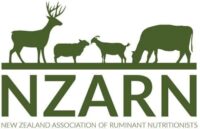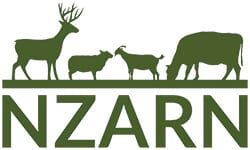Search results...
NZARN is proud to announce Biomin as an annual sponsor
NZARN are very grateful for the support of Biomin.
Sarah Pain – Sheep feed preferences for NZ native shrubs
Sarah completed her undergraduate and postgraduate study at the University of Adelaide, in South Australia. Sarah worked as a lecturer at the University of Adelaide prior to moving to New Zealand in 2008 to take a lecturing position at Massey University within the Pastoral Livestock Production group. Sarah has worked with a range of animal
Clive Bingham – Reproduction and GHG modelling
Clive discusses the effects of reproductive performance on GHG emissions through modelling. With Farmax he shows how with improvement or changes in reproduction or the 6 week calving rate, replacement rate and stocking rate, the emissions target can be reached without negative financial impact. A reduction in total emissions and emissions intensity reduction are difference
Laura Pattie – Milk synthesis, nutrition and milk docket
Laura graduated Bachelor of Veterinary Science with Distinction from Massey University and is a member of the Australian New Zealand College of Veterinary Sciences in Ruminant Nutrition. She worked as a farm veterinarian for 10 years before joining PGG Wrightson in 2020.Laura’s passion is in animal nutrition having learnt during her veterinary career how good
Amelia Almeida – Whenua Haumanu regenerative agriculture project
Dr. Amelia Almeida is committed to advancing sustainable ruminant production systems and enhancing feed efficiency while minimizing environmental impact. Dedicated to fostering innovation and resilience in the next generation of animal scientists at Massey University. Her current research focuses on measuring and mitigating greenhouse gas emissions in ruminant production. Amelias mission is to empower students
Nicola Schreurs – Animal nutrition and meat quality
Sarah kicked off defining carcass quality verses meat quality. Where classification characteristics associated with greater saleable meat yields and premium prices (weight, shape, fatness etc) verses how good the meat is. In regard to colour, palatability and nutritive values. Consumers are becoming more interested in what they are consuming. While a lot of NZ meat
Ajmal Khan – Effect of nutrition on the development and performance of calves
Dr Ajmal Khan gave a very engaging talk on calf rearing. The talk began by setting the scene on the challenges around calf rearing and reviewed the current state of knowledge. Particular attention was given to colostrum management including the timing of colostrum nutrition of the neonate. Components of colostrum were reviewed, and commentary given
Dr Ian Lean – Feed Additives
Ian stepped conference attendees through the role for feed additives in dairy rations, with a specific emphasis on those associated with management and control of rumen acidosis. Starting the presentation with an overview of ruminal acidosis, Ian stepped us through the definitions of clinical and sub-clinical acidosis and that acidosis is a continuum and is
Dr Emma Cuttance, Facial Eczema
Dr Emma Cuttance has been key in the recent research carried out in NZ for facial eczema (FE). Within her presentation, she walks through the impact of FE, the damage caused by FE going untreated, and the reliability of treatment options. NZARN members a copy of the presentation is available below if you are logged
Dr Lance Baumgard, Inflammation
Lance kick started the session with an over view of the GIT, and the impact of how overall health can stem from the GIT. He discusses the thickness of the rumen which can be > 10 layers thick, compared the intestinal wall which is much thinner. The intestinal track has adaptations to increase the nutrient
Simon Redmond, GHG Mitigations, One View
Simon kicked off with his background as a dairy consultant and emphasized that this is just one man’s view on ways GHG can be mitigated. He highlights that there are mitigation strategies to support lower GHG with the use of highly digestible feed, ionophores and other feed additives such as yeasts. Simon discussed the ways

